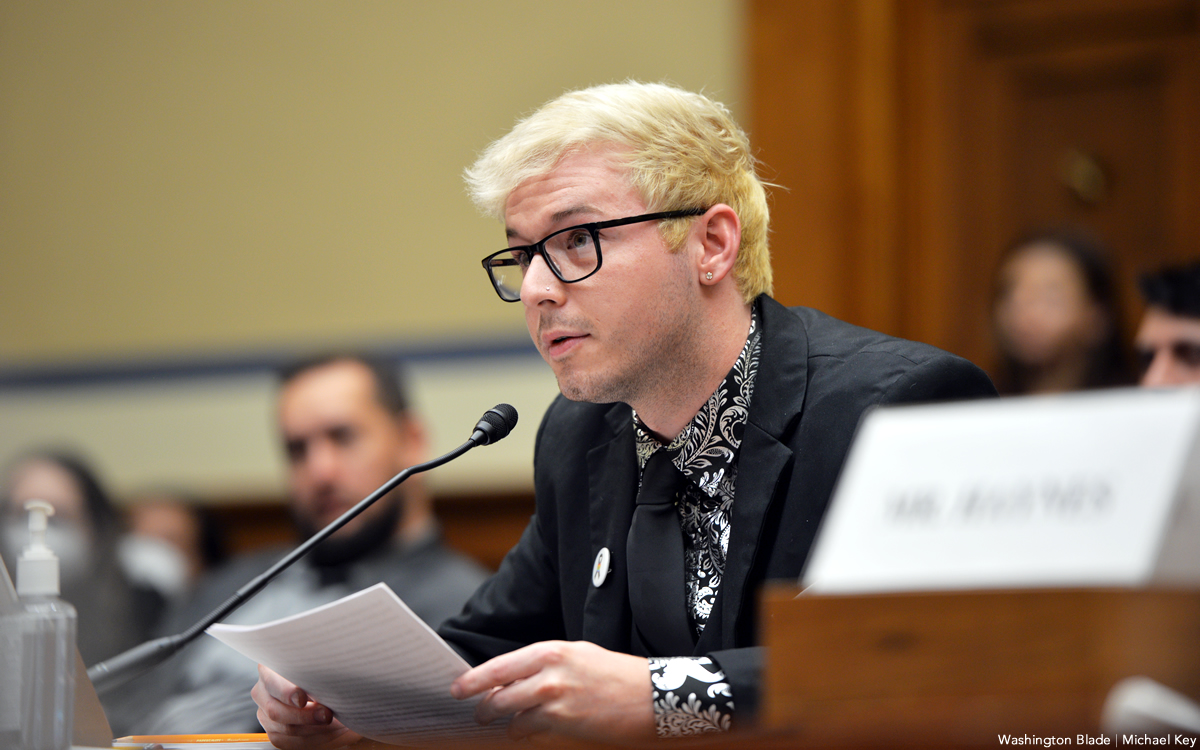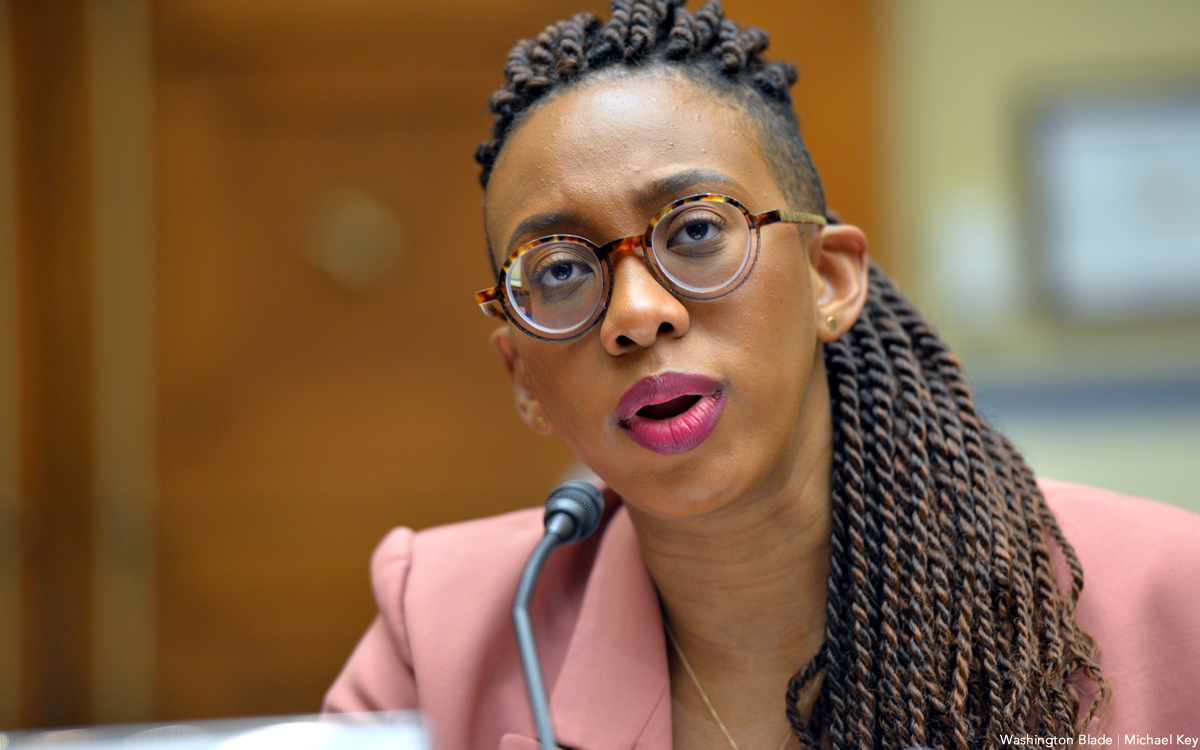Congress
Club Q massacre survivors testify before Congress
Hearing focused on rise of anti-LGBTQ extremism, violence

Two survivors of the Club Q massacre on Wednesday testified during a House Oversight Committee hearing that focused on the rise of anti-LGBTQ extremism and violence in the U.S.
Michael Anderson, a Club Q bartender, noted he grew up in Central Florida and “was taught in my private religious school and by many conservative voices to hate who I was, that being born gay was something to reject.”
Anderson told the committee that he “waited, silent and suffering” until he came out as gay at 16. Anderson also said gay bars and clubs “helped me embrace who I was and formed me into the man I am today.”
“On Nov.19th, 2022, a deranged shooter entered Club Q armed with an assault rifle, a pistol, an incredibly disturbing amount of ammunition and an even more disturbing amount of hatred in their heart, all while cowardly hiding behind a bulletproof vest,” said Anderson. “This shooter entered our safe space and our home with the intention of killing as many people as possible, as quickly as possible. They used a military style weapon that exists solely for the intention of killing other human beings and began to hunt us down as if our lives meant nothing.”
James Slaugh told the committee that he was at Club Q with his partner and sister when the gunman opened fire.
The gunman shot Slaugh in his arm, and his partner in his leg. Slaugh’s sister was shot more than a dozen times.
“The events of Nov. 19 were a nightmare come true,” said Slaugh. “Five wonderful people were still murdered: Ashley Paugh, Raymond Green Vance, Daniel Aston, Derrick Rump and Kelly Loving. We miss each of you.”
“Club Q was a second home and safe space to all of us,” he added. “Outside of these spaces we are continually being dehumanized, marginalized and targeted. The fear based and hateful rhetoric surrounding the LGBTQ community, especially around trans individuals and drag performers leads to violence. We shouldn’t have to fear being shot when we go to our safe spaces.”
Matthew Haynes, Club Q’s founding owner, in his testimony thanked local and state officials and LGBTQ rights groups — specifically One Colorado, Inside Out Youth Services in Colorado Springs and GLAAD — “for the efforts and support they have all provided to our community during this time.”
“We should not be meeting under these pretenses,” said Haynes. “I know that we as a community are in the thoughts and prayers of so many people, including many of you, unfortunately these thoughts and prayers alone are not saving lives, they are not changing the rhetoric of hate.”
Colorado prosecutors earlier this month indicted the suspected gunman with 305 charges that include first-degree murder, attempted first-degree murder and bias-motivated crime.
The hearing took place a day after President Joe Biden signed the Respect for Marriage Act during a ceremony on the White House’s South Lawn. (Only 39 House Republicans voted for the measure when it received final approval on Dec. 8, the same day that Russia released WNBA star Brittney Griner in exchange for Russian arms dealer Viktor Bout.) It also took place against the backdrop of a proliferation of anti-LGBTQ bills that lawmakers across the country have introduced; an increase in online hate speech, harassment and threats based on sexual orientation and gender identity and anti-LGBTQ violence.
“To the politicians and activists who accuse LGBTQ people of grooming children and being abusers, shame on you,” Anderson told the committee. “As leaders of our country, it is your obligation to represent all of us, not just the ones you happen to agree with.”
“Hate speech turns into hate action, and actions based on hate almost took my life from me, at 25 years old,” added Anderson. “I beg you all to consider your words before you speak them, for someone may use those words to justify action – action that may take someone’s life.”
Haynes in his testimony noted he received “hundreds of hate mail and emails” after the Club Q massacre.
“I woke up to the wonderful news that five mentally unstable faggots and lesbians and 18 injured,” read one of them. “The only thing that I’m mad about is that the faggots had courage to subdue the wonderful killer. I hope more shootings happen again. Have a blessed day.”
“The shooter was doing God’s work, five less fags not enough,” said another. “Those that stopped him are the devil.”
Haynes told the committee that now “is a critical time for national, state, local elected officials, community and religious leaders to drop the politics and work with LGBTQ leaders and small business owners like me to support and affirm LGBTQ events, venues, communities and must importantly people.”
“We need safe spaces like Club Q more than ever,” he added. “And we need you, as our leaders, to support and protect us.”
Democratic New York Congresswoman Carolyn Maloney, the committee’s outgoing chair, in her opening remarks noted the Club Q gunman’s “depravity robbed us of five innocent lives” before she read the victims’ names.
“In attacking Club Q, the shooter attacked the sense of safety of LGBTQI people across the country,” she said. “The attack on Club Q is not an isolated incident, but a trend of broader intimidation.”
Inside Out Youth Services President Jessie Pocock in her testimony noted at least one of the massacre’s victims had previously visited her organization.
“This is not ok. This is not normal,” said Pocock.
Human Rights Campaign President Kelley Robinson told the committee the Club Q massacre “is just one example of the violence that has shattered LGBTQ+ lives, families and communities in the past few years.”
“Violence and discrimination against LGBTQ+ communities is the tragic result of a society that devalues our lives — particularly the lives of black and brown transgender and gender non-conforming people,” said Robinson. “And this hate and violence is on the rise.”
Robinson in her testimony cited openly gay California state Sen. Scott Wiener, who received a bomb threat earlier this month that contained his home address and described him as a “pedophile” and a “groomer.”
“Fueled by nearly unfettered access to guns, and political extremism and rhetoric that is deliberately devised to make our community less safe, less equal and less free,” said Robinson. “Violence has become a lived reality for so many in our community.”

GLAAD President Sarah Kate Ellis, National Center for Transgender Equality Policy Director Olivia Hunt, Ilan Meyer of the Williams Institute, Charles Fain Lehman of the Manhattan Institute and Equality Florida Communications Director Brandon Wolf also testified.
Wolf in 2016 survived the Pulse nightclub massacre in Orlando, Fla., that left 49 people dead and 53 others injured.
Congress
Congress passes ‘Big, Beautiful Bill’ with massive cuts to health insurance coverage
Roughly 1.8 million LGBTQ Americans rely on Medicaid

The “Big, Beautiful Bill” heads to President Donald Trump’s desk following the vote by the Republican majority in the U.S. House of Representatives Thursday, which saw two nays from GOP members and unified opposition from the entire Democratic caucus.
To partially offset the cost of tax breaks that disproportionately favor the wealthy, the bill contains massive cuts to Medicaid and social safety net programs like food assistance for the poor while adding a projected $3.3 billion to the deficit.
Policy wise, the signature legislation of Trump’s second term rolls back clean energy tax credits passed under the Biden-Harris administration while beefing up funding for defense and border security.
Roughly 13 percent of LGBTQ adults in the U.S., about 1.8 million people, rely on Medicaid as their primary health insurer, compared to seven percent of non-LGBTQ adults, according to the UCLA School of Law’s Williams Institute think tank on sexual orientation and gender identities.
In total, the Congressional Budget Office estimates the cuts will cause more than 10 million Americans to lose their coverage under Medicaid and anywhere from three to five million to lose their care under Affordable Care Act marketplace plans.
A number of Republicans in the House and Senate opposed the bill reasoning that they might face political consequences for taking away access to healthcare for, particularly, low-income Americans who rely on Medicaid. Poorer voters flocked to Trump in last year’s presidential election, exit polls show.
A provision that would have blocked the use of federal funds to reimburse medical care for transgender youth was blocked by the Senate Parliamentarian and ultimately struck from the legislation — reportedly after the first trans member of Congress, U.S. Rep. Sarah McBride (D-Del.) and the first lesbian U.S. senator, Tammy Baldwin (D-Wis.), shored up unified opposition to the proposal among Congressional Democrats.
Congress
Ritchie Torres says he is unlikely to run for NY governor
One poll showed gay Democratic congressman nearly tied with Kathy Hochul

Gay Democratic Congressman Ritchie Torres of New York is unlikely to challenge New York Gov. Kathy Hochul (D) in the state’s next gubernatorial race, he said during an appearance Wednesday on MSNBC’s “Morning Joe.”
“I’m unlikely to run for governor,” he said. ““I feel like the assault that we’ve seen on the social safety net in the Bronx is so unprecedented. It’s so overwhelming that I’m going to keep my focus on Washington, D.C.”
Torres and Hochul were nearly tied in a poll this spring of likely Democratic voters in New York City, fueling speculation that the congressman might run. A Siena College poll, however, found Hochul leading with a wider margin.
Back in D.C., the congressman and his colleagues are unified in their opposition to President Donald Trump’s signature legislation, the “Big Beautiful Bill,” which heads back to the House after passing the Senate by one vote this week.
To pay for tax cuts that disproportionately advantage the ultra-wealthy and large corporations, the president and Congressional Republicans have proposed massive cuts to Medicaid and other social programs.
A provision in the Senate version of the bill that would have blocked the use of federal funds to reimburse medical care for transgender youth was blocked by the Senate Parliamentarian and ultimately struck from the legislation, reportedly after pressure from transgender U.S. Rep. Sarah McBride (D-Del.) and lesbian U.S. Sen. Tammy Baldwin (D-Wis.).
Torres on “Morning Joe” said, “The so-called Big Beautiful Bill represents a betrayal of the working people of America and nowhere more so than in the Bronx,” adding, “It’s going to destabilize every health care provider, every hospital.”
Congress
House Democrats oppose Bessent’s removal of SOGI from discrimination complaint forms
Congressional Equality Caucus sharply criticized move

A letter issued last week by a group of House Democrats objects to Treasury Secretary Scott Bessent’s removal of sexual orientation and gender identity as bases for sex discrimination complaints in several Equal Employment Opportunity forms.
Bessent, who is gay, is the highest ranking openly LGBTQ official in American history and the second out Cabinet member next to Pete Buttigieg, who served as transportation secretary during the Biden-Harris administration.
The signatories to the letter include a few out members of Congress, Congressional Equality Caucus chair and co-chairs Mark Takano (Calif.), Ritchie Torres (N.Y.), and Becca Balint (Vt.), along with U.S. Reps. Nikema Williams (Ga.), Hank Johnson (Ga.), Raja Krishnamoorthi (Ill.), Delia Ramirez (Ill.), Joyce Beatty (Ohio), Lloyd Doggett (Texas), Eleanor Holmes Norton (D.C.), Josh Gottheimer (N.J.), and Sylvia Garcia (D-Texas).
The letter explains the “critical role” played by the EEO given the strictures and limits on how federal employees can find recourse for unlawful workplace discrimination — namely, without the ability to file complaints directly with the Employment Opportunity Commission or otherwise engage with the agency unless the complainant “appeal[s] an agency’s decision following the agency’s investigation or request[s] a hearing before an administrative judge.”
“Your attempt to remove ‘gender identity’ and ‘sexual orientation’ as bases for sex discrimination complaints in numerous Equal Employment Opportunity (EEO) forms will create unnecessary hurdles to employees filing EEO complaints and undermine enforcement of federal employee’s nondiscrimination protections,” the members wrote in their letter.
They further explain the legal basis behind LGBTQ inclusive nondiscrimination protections for federal employees in the EEOC’s decisions in Macy v. Holder (2012) and Baldwin v. Foxx (2015) and the U.S. Supreme Court’s decision in Bostock v. Clayton County (2020).
“It appears that these changes may be an attempt by the department to dissuade employees from reporting gender identity and sexual orientation discrimination,” the lawmakers wrote. “Without forms clearly enumerating gender identity and sexual orientation as forms of sex discrimination, the average employee who experiences these forms of discrimination may see these forms and not realize that the discrimination they experienced was unlawful and something that they can report and seek recourse for.”
“A more alarming view would be that the department no longer plans to fulfill its legal obligations to investigate complaints of gender identity and sexual orientation and ensure its
employees are working in an environment free from these forms of discrimination,” they added.
-

 U.S. Supreme Court1 day ago
U.S. Supreme Court1 day agoSupreme Court to consider bans on trans athletes in school sports
-

 Out & About1 day ago
Out & About1 day agoCelebrate the Fourth of July the gay way!
-

 Maryland4 days ago
Maryland4 days agoSilver Spring holds annual Pride In The Plaza
-

 Opinions4 days ago
Opinions4 days agoSupreme Court decision on opt outs for LGBTQ books in classrooms will likely accelerate censorship








